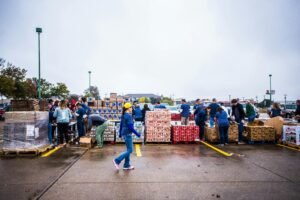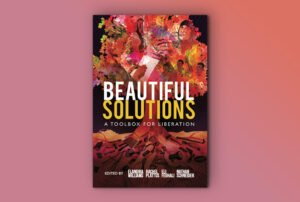
State of the Movements is a recurring NPQ column dedicated to tracking the pulse of social movements and the solidarity economy in 2025.
“As goes the South, so goes the nation.” This maxim may not yet be standard among political analysts, but its truth is undeniable. Nowhere is this more evident than in Atlanta, a city steeped in both radical history and corporate reinvention.
Beyond the familiar narratives of a “Black Mecca” or a Democratic stronghold, Atlanta is a battleground where grassroots movements, labor struggles, and corporate influence collide. The city holds a strategic position, not just geographically but in the broader political landscape of the South, where movements for economic justice, racial equity, and abolitionist futures take shape and fight for survival.
Atlanta occupies a unique position in the South, both as a site of historical Black economic and political power and as a contested space for social movements.
As the present contradictions of racial capitalism sharpen and the cracks of neoliberal solutions give way to reveal the facade of racial progress, communities are searching for solutions transcending business-as-usual identity-based social justice driven by national nonprofits. There are unique lessons in Atlanta about sustaining movements beyond philanthropic support. The urgency of the moment demands that we learn lessons from the past and embrace radical solutions.
Atlanta as Bellwether—Or Anti-Revolutionary Bulwark
Jerome Scott, a longtime labor organizer and cofounder of Project South, embodies the tradition of Southern radical resistance. His experience, from being fired from Chrysler to organizing with the League of Revolutionary Black Workers, shaped his perspective on the necessity of independent, working-class struggle. His experience early on helped him to realize not all skinfolk are kinfolk, and he found a sophisticated strategy in entering the hospitality workforce across from the factory that fired him—allowing him to connect and organize across races.
In a recent conversation with NPQ, Scott reflected on the founding of Project South and the challenges of maintaining movement integrity in an era of increasing co-optation by philanthropy and electoral politics. “We didn’t even apply for a single grant during the early years…we were clear on our values and the threat of capture,” he explains.
Project South was born out of necessity, created to serve as a space for political education, movement building, and base development among Southern communities. Unlike many organizations that rely on large foundation grants, Scott and his cofounders were intentional about rejecting funding that came with restrictions. Their decision was rooted in the understanding that corporate and philanthropic interests often seek to domesticate radical movements, making them palatable to power rather than effective tools for change.
Over the years, Project South has stood as a counterweight to the creeping professionalization of people-powered community and social justice efforts by the nonprofit industrial complex. It has remained committed to organizing people at the grassroots level, particularly in the South, where systemic underfunding has historically left movement organizations to fend for themselves. This resistance to compromise has allowed Project South to build deep and lasting relationships with frontline communities, ensuring that its work remains relevant and accountable to the people most impacted by racial capitalism.
Atlanta occupies a unique position in the South, both as a site of historical Black economic and political power and as a contested space for social movements. As Scott and others have pointed out, the city has long served as a gatekeeper, determining which movements gain visibility and resources and which remain on the margins.
Spelman College brought civil rights leader Efia Nwangaza to Atlanta, and the Atlanta Project kept her there. The Atlanta Project, originally a part of the Student Nonviolent Coordinating Committee (SNCC), Nwangaza told NPQ, learned the lessons of revolutionary capture.
Across the South…corporate philanthropy and liberal electoral politics often work hand in hand to neutralize revolutionary demands for change.
“The ‘misleadership class’ had a general agreement that the movement would not ‘disrupt’ governance agreements and so the Atlanta Project-SNCC were often excluded from those discussions because we would not comply with the PR and marketing campaigns that Atlanta was the ‘city too busy to hate’ despite its repression of Black people,” Nwangaza said.
This same dynamic is evident today in the ongoing Stop Cop City movement, where activists and organizers are pushing back against the city’s efforts to expand policing at the expense of Black and working-class communities. Notably, among the advances in activism and impact this movement has accomplished amidst immense state repression, the Stop Cop City movement stands out for its integration of mutual aid, cooperative organizing, and communal organizing into more traditional organizing tactics.
As organizer Julian Rose observes, “One of the main things that has felt so different about this movement is the ways people have cared for one another. This can be explained, in part, by the fact that many of the Black radical youth organizers in Atlanta who have been holding down mutual aid since the initial stages of the pandemic are also sustaining care work in support of the Stop Cop City movement.”
The struggle in Atlanta reflects a broader pattern across the South, where corporate philanthropy and liberal electoral politics often work hand in hand to neutralize revolutionary demands for change. The myth of Atlanta as a “Black Mecca” has been weaponized to obscure the deep racial and economic inequalities that persist in the city. The 2020 State of the South Report from the Southern Movement Assembly makes it plain: “Despite its richness in diverse landscapes and natural resources, the South is financially ranked as the region with the most poverty in the country and with pockets of persistent poverty throughout, particularly in parts of Arkansas, Louisiana, Mississippi, Alabama, and Georgia (also known as the Black Belt).”
Sign up for our free newsletters
Subscribe to NPQ's newsletters to have our top stories delivered directly to your inbox.
By signing up, you agree to our privacy policy and terms of use, and to receive messages from NPQ and our partners.
While Black elites have amassed political and financial power, the vast majority of Black Atlantans continue to experience high rates of poverty, housing insecurity, and labor exploitation. A 2018 Bloomberg analysis found Atlanta to have the highest wage inequality in the United States.
Change Is Gonna Come
What is becoming clearer as national multimillion-dollar nonprofits fail to mobilize true oppositional forces in the face of authoritarianism and fascism, and no working-class solutions can be found in their strategic plans, the people need something else.
Resist and Build emerges in the landscape as an approach gaining traction and popularity with folks defecting from establishment social justice siloes. The Resist and Build formation seeks to enhance coordination between those rooted in a “fight the bad” organizing approach and those focused on “building the good” by developing alternatives to the extractive and exclusive systems that have gotten us here. By fostering trust and collaboration, these efforts can help counteract the fragmentation that often weakens movements.
This is what Emery Wright, executive director of Project South calls parallel organizing.
Wright notes that avenues to pursue an “inside game” are increasingly closed and says Southern movement builders ought to consider examples from the Global South as the state infrastructure erodes at home, no longer delivering care for our communities: “Parallel organizing and movement building looks like increasing liberated or autonomous zones of mutual aid, providing communities with food, political education, and even responding to health and safety needs apart from the state,” he tells NPQ.
There is room and opportunity…for the work of resistance and of building cooperative, community-controlled alternatives.
Such parallel solutions are abundant across the South, rooted in generations of cooperation out of necessity amid scarcity, oppression, and exclusion. As the Highlander Research and Education Center reveals in its Solidarity Economy in the South report, “Much of this history is hidden in plain sight, from the mutual aid societies that bought freedom for enslaved people, to the Underground Railroad network that helped shelter and transport Blacks escaping north. These cooperative structures were key to evading the repression of white supremacy.”
Rooted in Civil Rights History
Examples from history include the Cooperative Workers of America, formed in South Carolina in the 19th century which, Dr. Jessica Gordon Nembhard notes, built cooperative stores, a free cooperative school system, and tackled issues of wages, working conditions, and electoral reform. Like many African American cooperative initiatives, CWA offered women membership status equal to men.
Similarly, Harold McDougall in Black Baltimore examines 20th-century organizing in Old West Baltimore, lifting up how the Black community created its own “civic infrastructure”—“a cooperative economic, political, and social system that grows out of the community itself” and acted as a kind of “shadow government.”
The civil rights movement helped spur many cooperative associations and organizations, some of which continue today. From 1969 to 1985, New Communities ran the nation’s first community land trust, a farm collective in South Georgia. Owned and operated by approximately a dozen Black farmers on a 5,700-acre farm, it continues today—after winning a $12 million US Department of Agriculture settlement due to previous unjust credit denial—as an agribusiness and economic development initiative on a 1,600-acre retreat center and working farm near Albany, GA.
Key to the survival and spread of these grassroots initiatives has been the work of those providing movement infrastructure.
For example, founded in 1967, the Federation of Southern Cooperatives offers training, technical assistance, advocacy, marketing, and fundraising to cooperatives and credit unions composed of primarily African American small farmers and timberland owners across the rural South.
Looking further back to the 1930s, Highlander—located in New Market, TN—has long played a significant role in catalyzing Southern and Appalachian grassroots organizing and movement building, including when it housed the Citizenship Schools effort led by Septima Clark that supported voter rights organizing throughout the South.
Building a Vision for Today
Highlander’s work continues. In 2010, Highlander helped form the Southern Grassroots Economies Project (SGEP) to promote and launch sustainable cooperative economies. CoopEcon, one of SGEP’s major projects, continues to meet annually under the leadership of the Federation of Southern Cooperatives. Cooperation Jackson, founded in 2014, forms part of a broader wave of cooperative organizing in the South.
As the fusion of mutual aid and activism within these historic and emerging threads of movement work demonstrates, there is room and opportunity amid an increasingly authoritarian and corporatized landscape for the work of resistance and of building cooperative, community-controlled alternatives to not only co-exist but to find strength in one another.
This work is held together by a common vision: namely, that bottom-up organizing is the only path to build the political will needed to respond to the threats that we face and sustain our future and ourselves.











